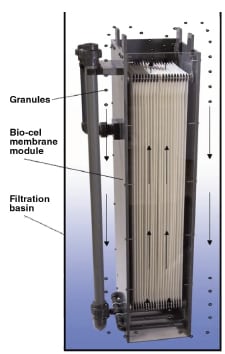
For wastewater treatment, membrane bioreactors (MBRs) provide superior effluent quality in a small footprint compared to alternative activated-sludge treatment methods. However, MBRs are prone to fouling, and thus may require frequent membrane cleaning with the associated manpower and chemical costs. Microdyn-Nadir GmbH (Wiesbaden; http://www.microdyn-nadir.de; Booth 317), in cooperation with Darmstadt University (both Germany), has developed a unique fouling-control process, called Bio-Cel-MCP, which does not require chemicals. Tests conducted on two pilot plants operating continuously for more than 400 days have demonstrated that the process leads to a 40% increase in flux compared to a standard MBR operating without MCP, says Stefan Krause, head of water-treatment technology & applications at Microdyn-Nadir.
The MPC process is based on the principles of fluidized-bed technology. Small (3-mm dia.) plastic granules are added into the filtration basin (inside the activated sludge), and are forced to flow upward alongside the membranes by an air-induced crossflow — mechanically cleaning the membrane as they rise — and then settle back down by gravity after leaving the module (diagram). In the pilot plants, back-washable, flat-sheet membranes (Bio-Cel) are used. The hydraulic flow conditions of this module allow the addition of particles for fouling control. Also, the mechanically strong and permanent hydrophilic flat sheet PES (polyethersulfone) membranes (Nadir UP150) have been shown to withstand the cleaning action of the granules as demonstrated by the continuous operation of the MBR module at high flux rates (23.6 gallons per square foot of membrane per day) without significant decrease of permeability, says Krause. After more than one year of operating the two pilot plants, the average COD (chemical oxygen demand) removal was about 95%, and online measurement of the turbidity of the effluent showed no disturbance, indicating a constantly high removal of suspended solids and hence an intact membrane, he says. Krause estimates the return-on-investment for an MPC system at about six months.
Gerald Ondrey